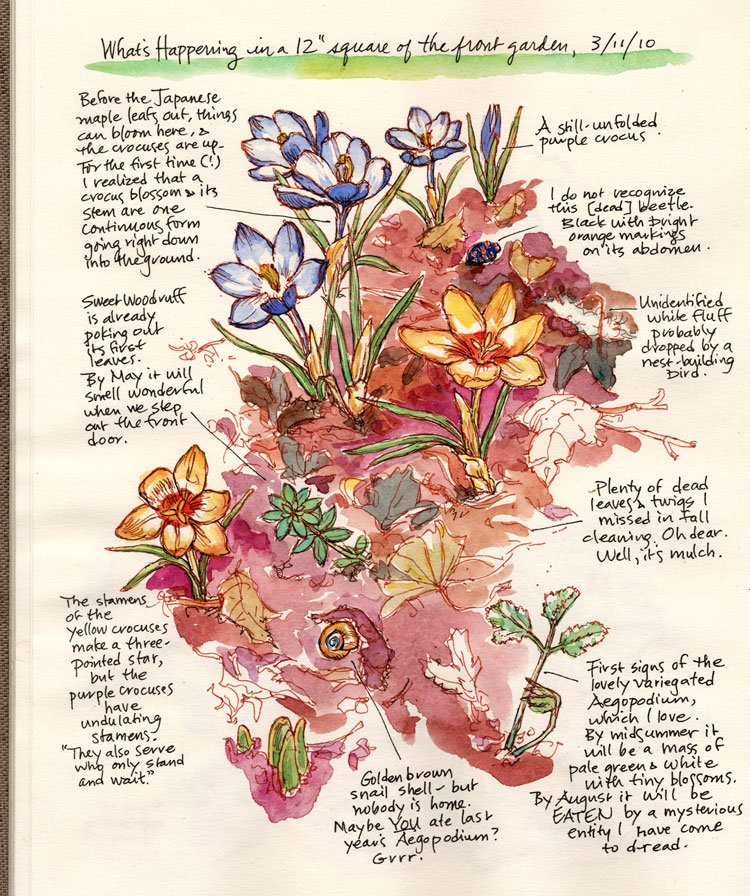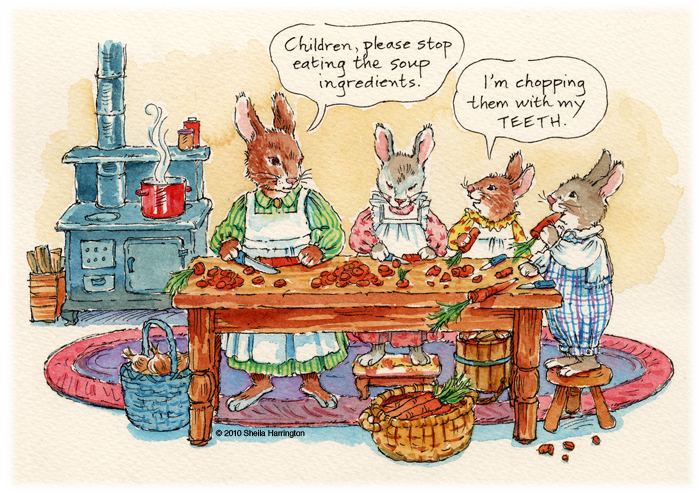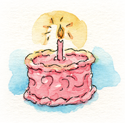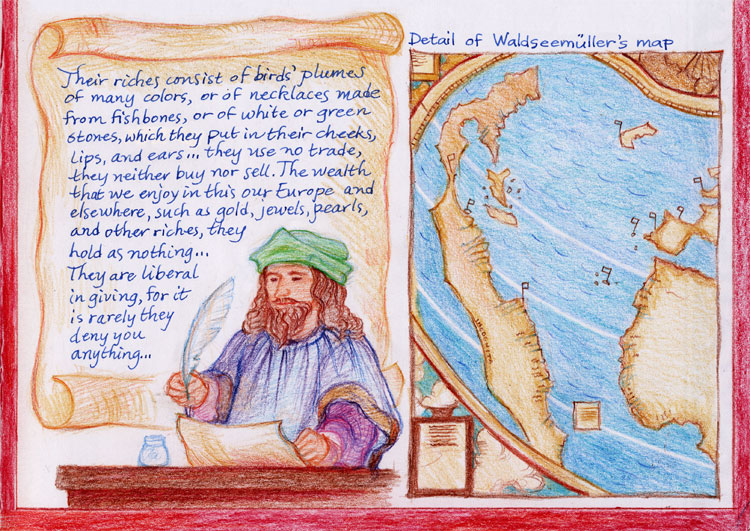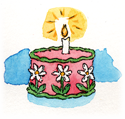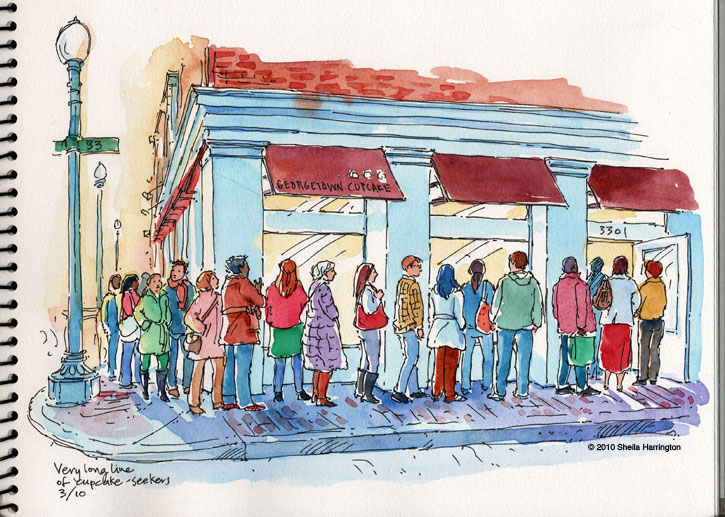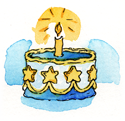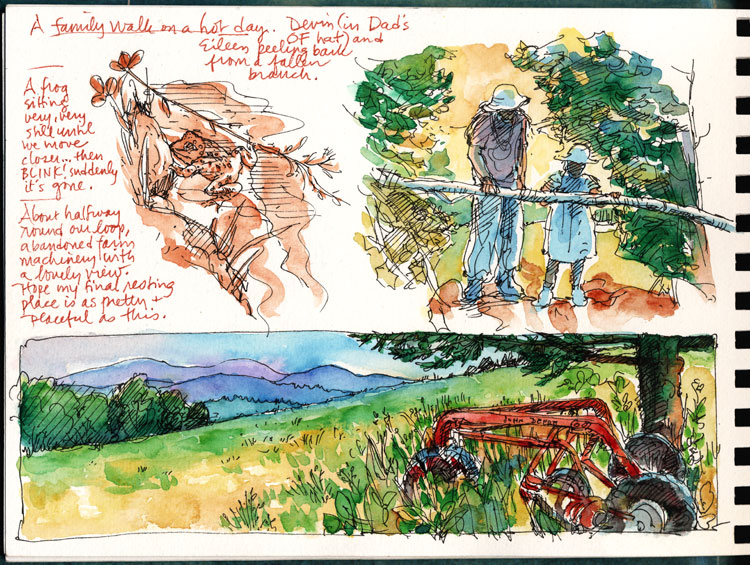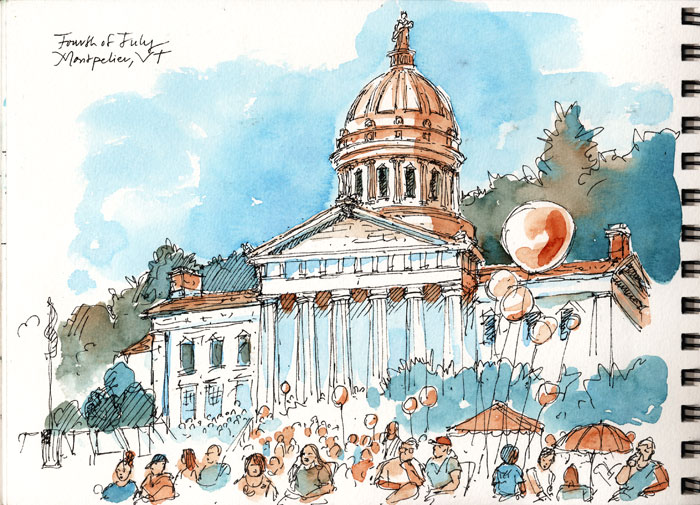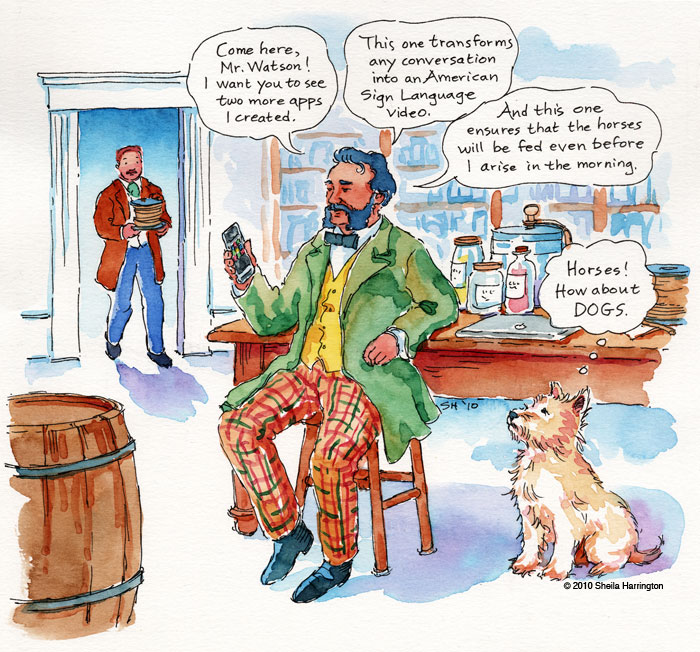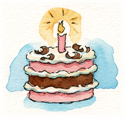Today all the text is in the sketch.
Month: March 2010
Lentil Soup
For years I’ve assumed that there was an etymological connection between “lentil” and Lent.” You have no idea how disappointed I am to have discovered recently that it is nonexistent. It seemed so perfectly and seasonally appropriate. Sigh. Well, more on that later. In the meantime, here is my favorite recipe for “Lent”-il soup, from Mollie Katzen’s Moosewood Cookbook, modified somewhat by me:
Pick over & rinse 3 cups raw lentils. Simmer them in 7 cups water or stock (I use veggie bouillon), on the stovetop or in a crock pot, until lentils are almost tender.
Saute in olive oil 2 tsp. fresh minced garlic, 1 cup chopped onion, 1 cup minced celery, and 1 cup chopped carrots, until almost tender. Add to almost-tender lentils along with 1-1/2 cups chopped fresh tomatoes or, lacking those, fire-roasted canned tomatoes; 2 T dry red wine; 2 T lemon juice; 1-1/2 T molasses or brown sugar; 1 T wine vinegar; 1 T capers. Simmer for a while longer until lentils and veggies are tender. Add black pepper and salt to taste.
This is even better the next day, after flavors have blended.
Amerigo the Beautiful
If you live in North America, when you awaken in the morning do you lie in bed gazing at the sky and thinking to yourself, “Why is this continent named America when it might have been called any number of things?” Well, if so, I can show you this page from our current homeschooling lesson book: it is named for Amerigo Vespucci (1452-1512). Perhaps now a little light bulb goes on in your head, a memory from an old geography class.
Today is Vespucci’s birthday, although how this is known is amazing to me—old baptismal records I suppose. Vespucci was born in Florence, Italy, and in adulthood he went to work for a Medici banking/investment house in Seville, Spain that helped finance Columbus’ second voyage to the New World (the one that was to prove beyond a doubt Columbus had indeed reached India).
Vespucci gives the impression of having been a bright, lively fellow with either great charisma or influential contacts, because he was invited by two different kings (of Castile and of Portugal) to participate as an observer on four voyages to the unfamiliar yet promising lands across the Atlantic. Since he was tiring, as he wrote, of his profession’s “frail and transitory benefits” (which observation remains true in the 21st century), he packed his trunk and off he went.
These expeditions actually ventured much further south than had Columbus’ ships, exploring the coast of what would become Brazil, stopping for days or weeks at a time to look around and trade/dine/lodge/fight with the people they met along the way. It became clear that south of the Caribbean islands was an entirely unexpected continent.
When Vespucci returned to Europe, he published accounts of his travels, describing the new landscape with its strange birds, plants, animals, the people and their customs, and the various adventures he had among them. He wrote in such engaging and entertaining detail (also poignant and dismaying to a modern eye) that it caught the attention of mapmaker Martin Waldseemüller, who decided to name the surprise continent in Vespucci’s honor on his brand-new map of the world. And America it remained, eventually coming to mean not only the southern but the central and northern sections as well. The entire Western Hemisphere! The most you can hope for today is to get an avenue named after you, or perhaps a candy bar.
Cupcake Fever
Georgetown Cupcake often has a line out the door, but Sunday afternoon it was amazingly long, and customers were carting away cupcakes by the dozens. People were either stocking up on a supply to get them through the Oscars later that evening, or, with the approach of spring, planning to consume as many as possible while winter coats still disguise the results.
Inappropriate Multitasking
A Love Story
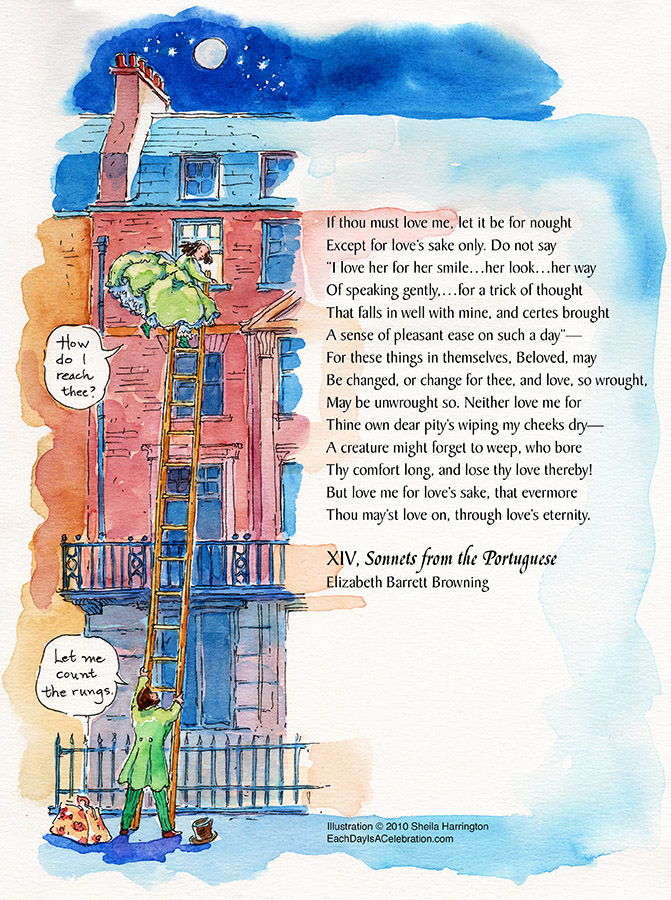
How is this for a romantic tale: Intellectual semi-invalid is still living at home in seclusion in her mid-thirties, quietly writing poetry and essays. Her published, widely read poems catch the attention of a handsome fellow-poet, six years her junior, who writes her a lengthy letter that says, among other things:
I love your verses with all my heart, Miss Barrett… so into me it has gone, and part of me it has become… and I love you too.
Thus began a correspondence—reluctant on her side, urgent on his, between Elizabeth Barrett (1806-1861), whose birthday it is today, and Robert Browning—that culminated in their growing mutual attachment and eventual secret elopement. Like many (all?) romantic tales, it had its dark underside, this one of slavery, paternal tyranny, multiple sad deaths, and mysterious illness.
Barrett was the first-born in a large prosperous family in Coxhoe, England, whose income derived partly from slave-worked plantations in Jamaica (perhaps this was related to Barrett’s later abolitionist stance). She was educated at home and demonstrated in childhood a gift for language: writing poetry, reading Milton, Shakespeare, and Dante, and learning Greek, Latin, and Hebrew (incorporated later into her poetry) sufficiently well to take up translation and analysis. To these she later added Italian, German, and Spanish.
But by age twenty she was already declining physically from some unknown, untreatable cause. The deaths of her mother and grandmother took their toll on her, and the accidental drowning of a favorite brother made her a recluse in her misery. In the meantime the abolition of slavery in England brought an end to the Jamaica income and obliged the family to live simply. Throughout all this she continued to write and publish essays and poetry, passionate, deeply felt, finely crafted, expressive of political and social as well as personal themes. And despite her seclusion, she corresponded widely with other writers and scholars.
Thus Browning was smitten. When he finally whisked Barrett off secretly to tie the knot and honeymoon in Italy, her father disinherited her—as he did each of his children who chose to marry. Some family therapy would not have been amiss here.
After their marriage Barrett showed Browning the sonnets she had been writing, the most famous of which (not the one above, but number XLIII) has been widely reproduced (and parodied). The couple stayed in Italy and, despite their late start, Barrett/Browning gave birth to a little Robert when she was 43. So their tale concludes probably as happily as any—with the two of them madly in love, raising their babe, writing poetry together, respected, reasonably comfortable, and in ITALY besides. Happy Birthday (and apologies), Elizabeth Barrett Browning, with gratitude not only for the poetry but for the love story.
More Vermont
Follow-up to Each Day post 3/4: more sketches from a Vermont trip, this one from an afternoon hike along country lanes.
To see some really beautiful images of Vermont, go to the blog of Vermont artist Susan Abbott, who, among the many other things she does, has been traveling the state capturing its wonders in paint and sketchbook. Her son is the creator of the “802” video mentioned in yesterday’s post; obviously talent runs in the family.
Green Mountain State
Although I’ve only visited a few times, I am a great admirer of the state of Vermont. Beautiful, sheep-strewn landscape; charming, funky old country towns; progressive politics; independent, interesting, self-employed people—it is both green and cool in all senses of those words.
Long ago home to Beluga whales when it was an inland sea, then to Algonquin-speaking Native American tribes, it was first spotted by Europeans when Samuel de Champlain sailed its eponymous lake in 1609, leading the way for French exploration and settlement. And for a while it was under French rule. Then British rule. But Vermont declared itself an independent republic in 1777, taking the name from its French heritage, and wrote itself a constitution abolishing slavery, setting up public schools, and granting the vote even to non-landowners. (Male ones, anyway. There are limits even to Vermont’s progressive ideas.)
Today is the anniversary of the day in 1791 when Vermont finally decided to join the Union as its 14th state, a decision some Vermonters probably regret as they see how the rest of us are lagging behind them.
For a laugh to start your day, check out this funny rap video parody made by the son of a Vermont friend, called “802” after the state’s single area code. You have to listen twice to catch some of the lines:
We like our Cabot cheddar extra sharp
Our roofs have leaks so we patch it with a tarp
Cellphone service questionable
Farmers Market is our biggest festival
Got creamiest milk in the fifty states
We go on picnics and dine off paper plates
Biggest piles of snow in the USA
Yeah we made it legal in this state to be gay
Happy Anniversary, Vermont! Stick with us—we’re coming along.
Saved by the Bell
Today is the birthday of Alexander Graham Bell (1847-1922), whom many may think of as American but who was actually born in Edinburgh, Scotland (he later became an American citizen). Bell was practically destined for his future work, given his background—grandfather a speech teacher/researcher/writer, and father an elocution specialist who developed something called “Visible Speech,” a sort of alphabet of lip, throat, and tongue positions used in talking, in order to train deaf people to speak. Those were the days when use of the hands while speaking—even if you weren’t deaf—was considered unseemly in Anglo-Saxon culture. Humph.
A bright, curious, inventive boy anyway, interested in mechanics, botany, and music, he took up the family passion: the study of speech. Even his own mother’s growing deafness was an encouragement. He was homeschooled for a while, then sent for a few years of formal education, culminating in a combined learning/teaching career, but he always pursued his own experiments on the side. After Bell’s two brothers died of tuberculosis, his alarmed parents decided to take their sole remaining son, always delicate, for a cure. Where? To the Swiss Alps, you ask? No… to Canada! where they bought a farm on a river and converted a carriage house into a workshop for Alexander’s tinkering. It did the trick. Parents, take note.
Bell went on to a career of teaching deaf pupils in Boston, but carried on his experiments, and eventually succeeded in producing, with assistant Thomas Watson, a “harmonic telegraph”—the telephone; founding Bell Telephone Company; and going on to create the metal detector, the wax recording cylinder (later used in the phonograph), and the first, and very successful, hydrofoil boat.
It’s hard to imagine a world without Bell’s telephone. Perhaps it was inevitable—others were exploring along the same lines—but it doesn’t diminish the wonder of his accomplishments and of his lively inventive being.
So go call your Mom, and wish her a Happy Alexander Graham Bell’s Birthday.

